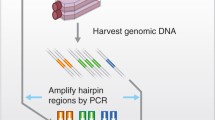Abstract
Forward genetic screens across hundreds of cancer cell lines have started to define the genetic dependencies of proliferating human cells. However, most such screens have been performed in vitro with little consideration into how medium composition might affect gene essentiality. This protocol describes a method to use CRISPR/Cas9-based loss-of-function screens to ask how gene essentiality in human cell lines varies with medium composition. First, a single-guide RNA (sgRNA) library is packaged into lentivirus, and an optimal infection titer is determined for the target cells. Following selection, genomic DNA (gDNA) is extracted from an aliquot of the transduced cells. The remaining transduced cells are then screened in at least two distinct cell culture media. At the conclusion of the screening period, gDNA is collected from each cell population. Next, high-throughput sequencing is used to determine sgRNA barcode abundances from the initial and each of the final populations. Finally, an analytical pipeline is used to identify medium-essential candidate genes from these screen results.
Access this chapter
Tax calculation will be finalised at checkout
Purchases are for personal use only
Similar content being viewed by others
References
Kory N, Wyant GA, Prakash G et al (2018) SFXN1 is a mitochondrial serine transporter required for one-carbon metabolism. Science 362:eaat9528
Wang T, Yu H, Hughes NW et al (2017) Gene essentiality profiling reveals gene networks and synthetic lethal interactions with oncogenic Ras. Cell 168:890–903.e15
Gilbert LA, Horlbeck MA, Adamson B et al (2014) Genome-scale CRISPR-mediated control of gene repression and activation. Cell 159:647–661
Wang T, Birsoy K, Hughes NW et al (2015) Identification and characterization of essential genes in the human genome. Science 350:1096–1101
Larrimore KE, Rancati G (2019) The conditional nature of gene essentiality. Curr Opin Genet Dev 58:55–61
Meyers RM, Bryan JG, McFarland JM et al (2017) Computational correction of copy number effect improves specificity of CRISPR–Cas9 essentiality screens in cancer cells. Nat Genet 49:1779
Hart T, Tong AHY, Chan K et al (2017) Evaluation and Design of Genome-Wide CRISPR/SpCas9 knockout screens. G3 genes genomes. Genetics 7:2719–2727
Behan FM, Iorio F, Picco G et al (2019) Prioritization of cancer therapeutic targets using CRISPR–Cas9 screens. Nature 568:511–516
Faubert B, Solmonson A, DeBerardinis RJ (2020) Metabolic reprogramming and cancer progression. Science 368:eaaw5473
Kaymak I, Williams KS, Cantor JR et al (2020) Immunometabolic interplay in the tumor microenvironment. Cancer Cell 39:28–37
Jain IH, Calvo SE, Markhard AL et al (2020) Genetic screen for cell fitness in high or low oxygen highlights mitochondrial and lipid metabolism. Cell 181(3):716–727.e11
Han K, Pierce SE, Li A et al (2020) CRISPR screens in cancer spheroids identify 3D growth-specific vulnerabilities. Nature 580:136–141
Cantor JR (2019) The rise of physiologic media. Trends Cell Biol 29:854–861
Cantor JR, Abu-Remaileh M, Kanarek N et al (2017) Physiologic medium rewires cellular metabolism and reveals uric acid as an endogenous inhibitor of UMP synthase. Cell 169:258–272.e17
Rossiter NJ, Huggler KS, Adelmann CH et al (2021) CRISPR screens in physiologic medium reveal conditionally essential genes in human cells. Cell Metab. [online ahead of print]
Joung J, Konermann S, Gootenberg JS et al (2017) Genome-scale CRISPR-Cas9 knockout and transcriptional activation screening. Nat Protoc 12:828–863
Wang B, Wang M, Zhang W et al (2019) Integrative analysis of pooled CRISPR genetic screens using MAGeCKFlute. Nat Protoc 14:756–780
Hart T, Moffat J (2016) BAGEL: a computational framework for identifying essential genes from pooled library screens. BMC Bioinformatics 17:164
Zhang XD (2008) Novel analytic criteria and effective plate designs for quality control in genome-scale RNAi screens. J Biomol Screen 13:363–377
Acknowledgements
This work was supported by grant and fellowship support from the NIH (T32HG002760 to K.S.H. and K22CA225864 to J.R.C.). J.R.C. is an inventor on a patent application for HPLM (PCT/US2017/061377) assigned to the Whitehead Institute. Kimberly S. Huggler and Nicholas J. Rossiter contributed equally to this manuscript.
Author information
Authors and Affiliations
Corresponding author
Editor information
Editors and Affiliations
Rights and permissions
Copyright information
© 2022 Springer Science+Business Media, LLC, part of Springer Nature
About this protocol
Cite this protocol
Huggler, K.S., Rossiter, N.J., Flickinger, K.M., Cantor, J.R. (2022). CRISPR/Cas9 Screening to Identify Conditionally Essential Genes in Human Cell Lines. In: Zhang, R. (eds) Essential Genes and Genomes. Methods in Molecular Biology, vol 2377. Humana, New York, NY. https://doi.org/10.1007/978-1-0716-1720-5_2
Download citation
DOI: https://doi.org/10.1007/978-1-0716-1720-5_2
Published:
Publisher Name: Humana, New York, NY
Print ISBN: 978-1-0716-1719-9
Online ISBN: 978-1-0716-1720-5
eBook Packages: Springer Protocols




